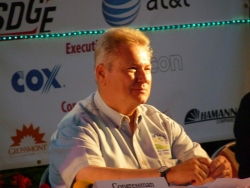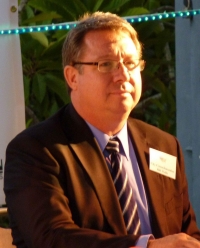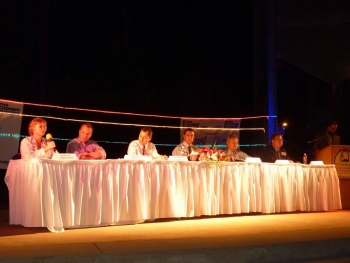
By Miriam Raftery
August 22, 2010 (El Cajon ) – Two Congressmen and four local lawmakers fielded questions from the audience Friday night, trading quips and barbs on topics ranging from healthcare to gay marriage. The occasion was the San Diego East County Chamber of Commerce’s annual “Politics in Paradise” event in the Water Conservation Garden at Cuyamaca College, where the weather was sultry and the politics even hotter.
Each legislator led off with opening statements.

Congressmen Bob Filner (D-San Diego) and Duncan Hunter (R-El Cajon) presented highlights and lowlights from Washington. Supervisor Dianne Jacob offered a county perspective, while Councilmembers George Gastil, Bill Wells, and Ernest Ewin represented the cities of Lemon Grove, El Cajon and La Mesa. Gastil, Wells and Ewin were added to the panel after the Chamber received last-minute cancellations from State Senator Denise Ducheny and Assemblyman Marty Block, who were unable to attend due to legislative haggling over the budget in Sacramento. “We offered them free seats—and told them they’d be facing the audience,” quipped moderator Barry Jantz.
Jacob led off by praising the County for spending less than it takes in and for saving taxpayers money by outsourcing services, cutting staff and working toward pension reforms while keeping in place public safety services amid lean budget times.
 Filner, who chairs the House Veterans Affairs Committee, spoke on the importance of making sure our returning troops come home with “all the care and dignity” that the deserve. He has led efforts to increase healthcare and mental health benefits for veterans and enact a new G.I. bill that helps veterans attend college, also allowing benefits to be passed on to a spouse or child. He also authored a caregivers’ bill. “We have several thousand troops who will probably be under care for the rest of their lives,” he said, citing brain injuries and other traumatic injuries suffered by “these incredible heroes.”
Filner, who chairs the House Veterans Affairs Committee, spoke on the importance of making sure our returning troops come home with “all the care and dignity” that the deserve. He has led efforts to increase healthcare and mental health benefits for veterans and enact a new G.I. bill that helps veterans attend college, also allowing benefits to be passed on to a spouse or child. He also authored a caregivers’ bill. “We have several thousand troops who will probably be under care for the rest of their lives,” he said, citing brain injuries and other traumatic injuries suffered by “these incredible heroes.”
Hunter called “jobs and the economy” the most important issues, citing a $1.5 trillion deficit and 12.7% unemployment rate. “People are still losing jobs,” he said. “We need to stop spending, cut taxes, and help entrepreneurs.”
Gastil spoke of how the recession has his local government disproportionally. “Sales tax is way down. Property taxes are down . Our city is struggling to maintain essential services,” he said, blaming the city’s problems on dysfunctional state government as well as the economic downturn. Council opted against putting a sales tax increase on the ballot, limiting choices for the future. “We’re having to determine which services are most essential,” he said, expressing concern over timeliness of emergency response time if more cuts must be made.

Ewin praised La Mesa voters for passing the Prop D bond, which allowed construction of new public buildings that came in “on time and under budget.” He praised La Mesa’s quality of life and noted that the city is gearing up for its centennial in two years, adding, “It’s important to think what our communities will be like when they turn 100.” He cited the city’s consolidation of fire services with El Cajon and Lemon Grove as an important means of saving taxpayers money. He also wants to see the state stop taking funds from local governments.
 Wells said El Cajon is making progress with giving a facelift to its downtown and attracting some new businesses, though challenges remain. Sales tax revenues have fallen 13% and pension costs are rising annually. Ultimately, though, he predicted, “I think we’ll be an even better city.”
Wells said El Cajon is making progress with giving a facelift to its downtown and attracting some new businesses, though challenges remain. Sales tax revenues have fallen 13% and pension costs are rising annually. Ultimately, though, he predicted, “I think we’ll be an even better city.”
The panel of elected officials next fielded a series of questions submitted by audience members.
The first question asked what shovel-ready projects have received federal stimulus funding in San Diego County.
Gastil said Lemon Grove’s school district has gotten “quite a lot” and that other Lemon Grove projects include renewable energy and retrofitting. “We’re getting some jobs, and we will get more down the line.”
Hunter blasted the stimulus bill. “We are creating a socialist state,” he said. He noted that federal stimulus funds have helped stop some education budget deficits, but called that a “stop gap” measure.
Jacob said the County proposed $800 billion in shovel-ready projects in conjunction with SANDAG and local cities, but that less than $300 million was received. “I wouldn’t call this a stimulus,” she said.
Filner noted that two stimulus bills were passed by Congress, one under the Bush administration, the second by the Obama administration. “I voted against the Bush bail-out for big banks and insurance companies,” he said. He voted for the Obama bill, even though he said it gave “75% to the big guys” and only 25% to the types of projects he would prefer to see. Still, the measure helped his district by pumping “tens of millions” into transportation. “We stabilized the banking system and education.” Without the stimulus funds, he noted, “Tens of thousands would have been fired in education.”
The Democratic Congressman expressed frustration over trickle-down economics, the theory that if money is given to large companies it will trickle down in the form of jobs. “I don’t want to trickle down. I want to percolate up. We should help local banks and small businesses.” With what was spent bailing out big banks, he noted, “We could have saved every house in Chula Vista from foreclosure…We have got to get money into local communities, not to the big guys.”
Ewin said that aside from energy efficiency funds, the only local transportation project that got stimulus funds was for Blue Line trolley improvements from Old Town to the border. He expressed hope that the U.S. Department will help fund future local projects in La Mesa, which has a trolley line and is close to three freeways, as part of the federal government’s announced support of mass transit.
Wells called the stimulus plan “a failure” and added that “it’s not the federal government’s job to find jobs for people in El Cajon.”
Officials were next asked if they agreed or disagreed with Arizona’s controversial immigration law.
“I agree. Is the sky blue?” Hunter quipped. He said Arizona took action due to the federal government’s failure to protect citizens along the border and expressed outrage at the U.S. Justice De partment filing a lawsuit to block Arizona’s law.
partment filing a lawsuit to block Arizona’s law.
Filner disagreed. “It’s an un-American law,” he said, drawing boos but later, applause after he elaborated. He cited two reasons for his opposition. “If people are too scared to cooperate [with law enforcement’ it’s bad for public safety. That’s why this law would never pass here. Former Sheriff Bill Kolendar understood that.” Secondly, Filner observed, “The thing that distinguishes us from any other country on earth is we don’t have to carry papers. That is a sign of a totalitarian government. In Arizona, who are they going to ask? You will have people who have beenAmerican citizens for generations who will be harassed because they look Hispanic.”
Hunter interjected that his wife, who is Polish, became a citizen “the right way” and reaffirmed his opposition to the law.
Gastil said the federal government should consider a guest worker program and comprehensive immigration reform, which he called “the best idea to come from the Bush administration,” recognizing that most immigrants come here for jobs. He also wants to see higher wage jobs created for Americans.
Jacob said she supports Arizona’s immigration law and called for a comprehensive immigration policy. She praised the border fence, which she said has been effective at stopping illegal trafficking on the border “to the extent that they are staging out by the Coronado Islands now.” She said there has been a shift in border crossers. “True, most came here for jobs and were not a threat to life or property, but that has changed—and it’s frightening,” she said, citing drug cartel crimes and kidnappings. Families of cartel members are moving their families to this side of the border, she added.
Wells said Arizona “wants to protect itself” and cited states’ rights as reason to support Arizona.
Another question focused on pension reform.
Ewin called current pension levels “unsustainable” and said La Mesa is working through negotiations to try and get a second tier pension level for future employees. Wells called the pension problem “monstrous” and said high pensions jeopardize the city’s future ability to fund public safety services. Jacob said losses in the stock markets have created losses in pension funds and is forcing rollbacks to “more reasonable levels” for public pensions. Gastil said Lemon Grove has made “a lot of progress” on pension reform but added that it would be wrong to make public employees bear more than their fair share of burden for the budget crisis. Hunter faulted “big labor” for pension problems.
Hunter faulted “big labor” for pension problems.
Asked about same-sex marriage, Filner said he supports it, then drew laughs by adding, “Duncan and I are coming out of the closet.”
Hunter called same-sex marriage a “travesty” and faulted a “liberal” judge for overturning Prop 8. (In fact, the judge was appointed by conservative Ronald Reagan.) “Marriage should be between one man and one woman. It’s what western civilization is based on,” he maintained.
Gastil, an American history teacher, noted that having three branches of government including an independent judiciary is an asset. “When Earl Warren led the court in putting together Brown vs. the Board of Education, President Eisenhower thought they were moving too fast towards desegration,” he recalled.
Jacob said she supports Prop 8 and opposes gay marriage.
The next question asked how local cities are addressing their budgets.
Ewin voted for putting La Mesa’s sales tax measure on the ballot, which voters approved. He wants to assure that reserves are maintained and priorities like public safety, parks and infrastructure are maintained. The city has cut staff since 2004 and outsourced some services to make ends meet.
Wells opposed a sales tax increase passed by El Cajon voters. He said Council is working to bring in new businesses such as Ross for Less and Sephora to boost the local tax base.
Gastil said Lemon Grove’s Council will have to “work even harder” than neighboring cities since the Council rejected a sales tax measure. “There is no easy answer,” he said, then encouraged audience members to “Shop Lemon Grove-our sales tax is less.”
Congressional panelists were asked their views on the troop pullout in Iraq.
“This is what victory looks like,” Hunter proclaimed, adding that the surge worked. He noted that his younger brother is in the final combat brigade heading home from Iraq. He added that 50,000 non-combat troops remain in Iraq, adding, We will probably always have troops in Iraq.”
Filner said the wars in Iraq and Afghanistan, begun by the Bush administration, have put America in debt. “We engaged in wars we did not pay for. All we did was borrow trillions of dollars,” he observed, adding that it costs $7 billion every couple of weeks to fund the wars. “I see young people coming home with brain injuries, amputations, and mental issues.” He noted that Alexander the Great, the British, and the Soviets all were unable to conquer Afghanistan due to the rugged terrain. “I think it’s time to bring our troops home now,” he said, then praised the military service of Hunter and others who have served in Iraq and Afghanistan.
Healthcare sparked one of the liveliest debates of the evening.
Hunter said of the federal healthcare bill enacted, “I didn’t read it…and I voted no,” he said, adding that employers don’t want to provide “government mandated health insurance.” He called for tort reform, high risk pools and allowing people to buy insurance across state borders instead. Hunter claimed he was never lobbied by the healthcare industry for the bill, which he said favors monopolies and has "no accountability or transparency…The bill did nothing to lower healthcare costs or help businesses.”
Filner asked, “If Duncan wanted affordable healthcare, why didn't he support my call for a public option?” Although the Obama bill did not include the public option that Filner wanted, he decided to vote for it anyway because “in my district, 140,000 people do not have health insurance, and 130,000 of them will have insurance when this bill goes into effect.” Filner added that children with asthma or other pre-existing conditions who were denied insurance are now entitled to coverage immediately, thanks to the healthcare bill.
Turning to Hunter, Filner challenged, “I dare you to repeal that.” He added that kids ages 23-27 will now be able to stay on their parents’ policies, and that the healthcare bill also helps seniors cover the “doughnut hole” in prescription drugs under Medicare. “I dare you to repeal these things, Duncan. You’ll make my day.”
Hunter fired back, “I actually would repeal that. If you’re 27 years old, how long are you going to stay on your parents’ insurance? It’s time to go out and get a job!”
Local legislators also offered their views. Wells called the federal healthcare bill “another step toward monstrously large government.” Ewin said the fiscal impacts on local cities' budgets are not yet known.
Gastil said the public, ever since the Truman administration, has “overwhelmingly supported a national healthcare plan.” He said the Obama healthcare enacted is “not perfect, buy it may be something we can build on.”
Jacob fears “we all will be paying more and may have less access.” She said it’s good that the uninsured will have coverage, but added that the state may pass costs along to local governments as unfunded mandates. “So we don’t know the impacts yet; we may need to take legal action.”
The panelists wrapped up with closing remarks.
Wells encouraged citizens to contact him with concerns about El Cajon. “We really want to hear from you.” He also offered praise for Filner for helping him assist a young soldier held improperly in Leavenworth. “He’s a great man,” the conservative councilmember said of the liberal Congressman.
Gastil urged legislators in both parties to work together to solve problems at the state and federal level. “In the 1930s, 15% of workers were employed by the federal government,” he said, noting that public works projects lifted America out of the Great Depression. “Even if these types of jobs were increased ten times under the stimulus, we would not have 15%.”
Ewin said La Mesa is working on disaster preparedness for “neighbors helping neighbors” in the event of an earthquake or fire. He thanked voters for passing the Prop D bond.
Hunter noted that “There’s no big fat cats up here,” and said when people lose jobs or go bankrupt, these are our friends. We need to get back to liberty, personal responsibility and not asking the person next to you to pay out of his wallet.”
Filner called for a stop to demagoguery around wedge issues such as abortion, immigration and gay marriage, and said the focus should be on jobs. He cited Benjamin Franklin, who observed that those who would trade liberty for security deserve neither.
Jacob announced that the County will be moving forward to build a $14 million new Sheriff substation in Rancho San Diego east of Skyline Church on Jamacha. The County has also invested in recreation opportunities for local kids, including sports fields skateparks, and next, an aquatic center at the new YMCA in Rancho San Diego. A new boutique winery ordinance will allow retail sales and tasting “by rights” for smaller wineries. In addition, the County is in the second of three phases of forming a San Diego Fire Authority to consolidate rural firefighting districts. “We are far better prepared today to fight fires than we were in 2003," Jacob concluded.

While elected officials engaged in verbal sparring inside the event, two of Hunter's opponents staged a protest rally outside. Democrat Ray Lutz and Libertarian Mike Benoit have been on a hunger strike to draw media attentoin to Hunter's refusal to debate them before mid-October. That's after absentee ballots have been mailed in San Diego County, where 60% voted absentee in the last election.







Recent comments